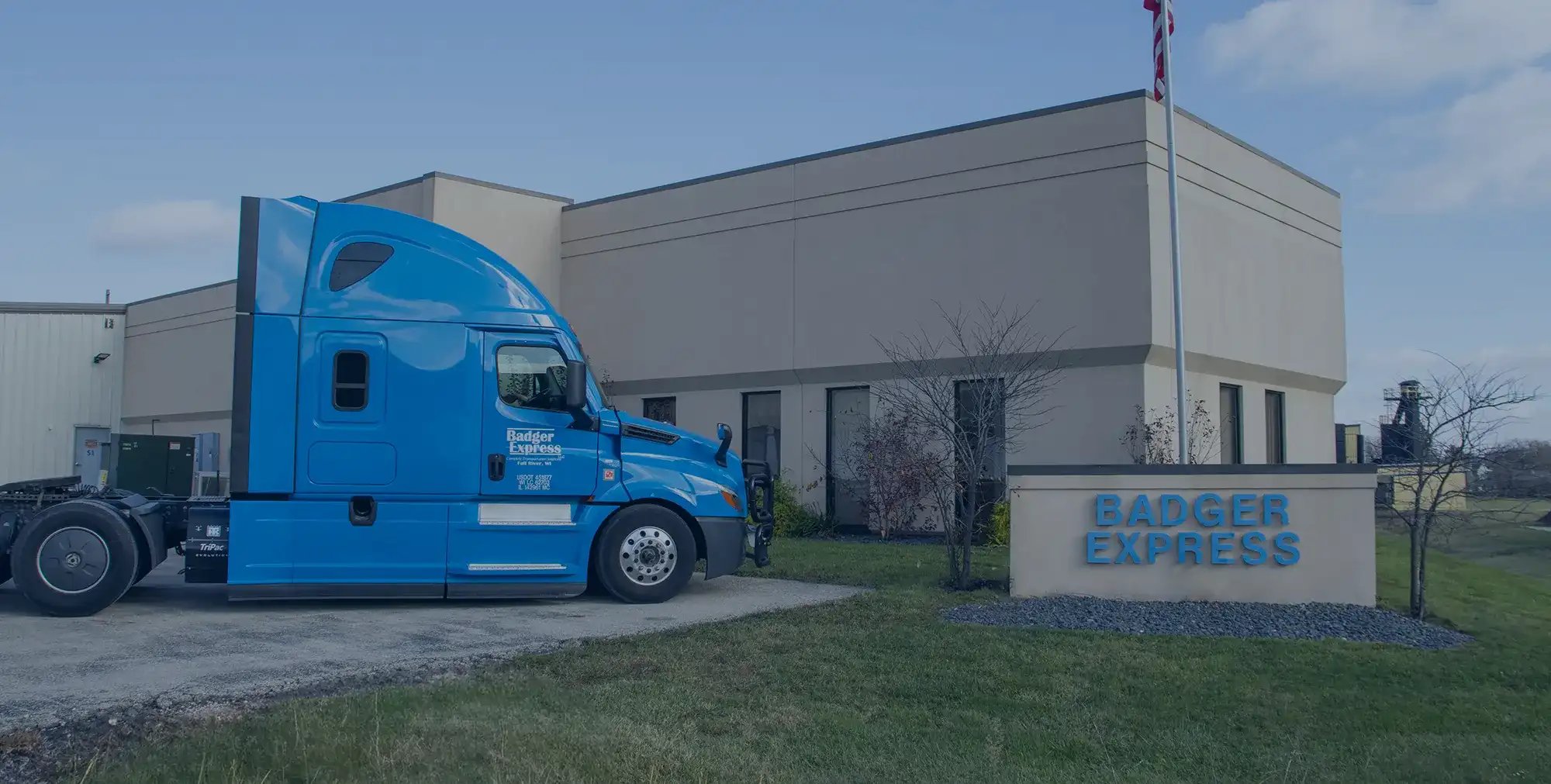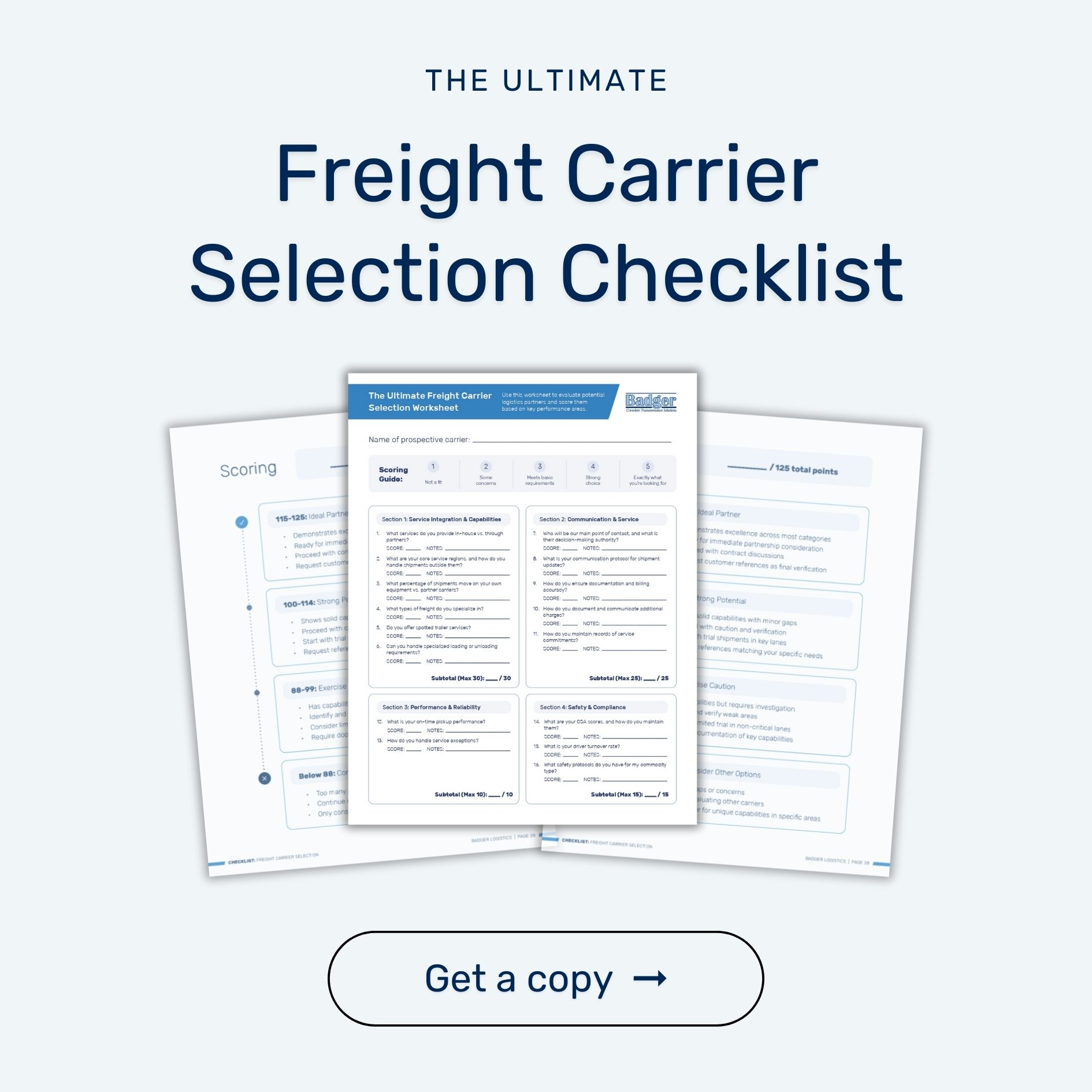Key takeaways
- Plastic manufacturing for food packaging requires strict adherence to Food Safety Modernization Act standards. Your logistics partner needs specialized equipment and trained drivers.
- Food grade trailers are essential for plastic pellet transportation. Contamination prevention is non-negotiable for products that will contact food.
- Clean, dust-controlled warehousing is crucial for maintaining plastic material quality and complying with food safety regulations.
- Just-in-time delivery keeps your manufacturing operations running smoothly. Make sure to choose a logistics partner with years of experience in the food grade plastic supply chain.
Badger Logistics provides integrated transportation solutions combining asset-based trucking, brokerage services, and warehousing to overcome Wisconsin's unique logistics challenges. Learn more about our Wisconsin shipping expertise or get a competitive rate quote to join 500+ shippers solving their freight challenges with one call.
A brief introduction
After 35 years in the transportation industry, I've developed deep expertise in handling specialized shipments for plastic manufacturers, particularly those producing materials for food packaging and containers.
One thing has become abundantly clear: the logistics requirements for plastics aren't just about moving freight—they're about ensuring product integrity and regulatory compliance in an industry where standards are exceptionally high.
The unique requirements of food-grade plastics
The plastic industry and food industry are deeply intertwined. Many of the plastic products we transport — pellets that will become milk jugs, food containers, takeout packaging, and the film used for products like beef jerky — will eventually come into direct contact with food products. This connection creates specific logistics requirements that go beyond standard shipping considerations, explained below.
|
Food-grade equipment requirements At Badger Logistics, we understand that plastic pellets and materials destined for food packaging require the same stringent standards as food products themselves:
|
|
Clean, controlled warehousing For plastic manufacturers who need storage solutions, the requirements are equally specific:
|
Optimizing the plastic manufacturing supply chain
Plastic manufacturing operations face unique logistics challenges that extend beyond basic transportation:
Just-in-time delivery requirements
Manufacturing efficiency depends on having the right materials at the right time. For plastic manufacturers, this means:
- Reliable Scheduling: Our asset-based fleet maintains a 97% on-time delivery rate, ensuring your production lines continue running without costly delays.
- Flexible Capacity: Our combined asset-based and brokerage capabilities allow us to scale resources to match your production schedules.
- Inner-Plant Transfers: We efficiently move materials between your manufacturing facilities and distribution centers, optimizing your internal supply chain.
Understanding material handling needs
Different plastic materials require specific handling approaches:
- Pellet Transportation: Most plastic raw materials we transport are pellets in Gaylords that will be molded into containers. These require clean, enclosed trailers and careful handling.
- Film and Sheet Materials: Plastic films and sheets for food packaging need protection from damage and contamination during transit.
- Finished Containers: Completed plastic packaging products require secure loading to prevent shifting and damage.
The value of industry experience
When selecting a logistics partner for your plastic manufacturing operation, experience in both plastics and food-grade transportation is invaluable. At Badger Logistics, our experience offers several distinct advantages:
- Regulatory Knowledge: We understand and comply with all aspects of the Food Safety Modernization Act that impact plastic materials destined for food contact.
- Problem Prevention: Our familiarity with plastic manufacturing needs means we anticipate and prevent common issues before they arise.
- Industry Connections: Our established carrier network understands food-grade requirements and has experience handling plastic materials.
- Relationship-Based Service: We develop long-term partnerships with our plastic industry clients, becoming an extension of their operations rather than just a service provider.
Logistics best practices for plastic manufacturers
Based on our decades of experience working with plastic manufacturers, here are the best practices that consistently yield optimal results:
|
1. Select carriers with food-grade expertise. Even though you're manufacturing plastic rather than food, your logistics partner should understand and comply with food safety standards. At Badger, our experience with both industries means we understand how to meet your specialized requirements.
|
|
2. Prioritize cleanliness and contamination prevention. From the cleanliness of trailers to warehouse dust control, maintaining pristine conditions throughout the supply chain is essential for plastic materials that will contact food.
|
|
3. Develop consistent just-in-time delivery systems. Work with logistics partners who understand manufacturing schedules and can guarantee reliable deliveries to maintain production efficiency.
|
|
4. Build integrated logistics solutions. Consider partners who can offer combined transportation and warehousing solutions to streamline your supply chain and reduce coordination complexity.
|
A quick case study in plastic logistics success
One of our long-standing clients manufactures plastic film for beef jerky packaging. Their operation requires absolute cleanliness, consistent deliveries, and compliance with all food safety regulations. By implementing our integrated transportation and warehousing solution, they've achieved:
- 99% on-time delivery performance
- Zero contamination issues in transit
- Reduced inventory carrying costs through just-in-time deliveries
- Simplified vendor management with one partner handling transportation and storage
Final thoughts and next steps
The plastic manufacturing industry, particularly for food packaging, occupies a unique position at the intersection of manufacturing efficiency and food safety. The logistics solutions supporting this industry must balance these dual requirements, providing both the reliability needed for efficient production and the specialized handling required for regulatory compliance.
At Badger Logistics, we've developed deep expertise in this specialized niche over our 35+ years in the industry. Our combination of food-grade equipment, trained personnel, and industry knowledge makes us an ideal partner for plastic manufacturers looking to optimize their supply chain while maintaining the highest standards of compliance and product integrity.
Talk to us for a better logistics experience

At Badger Logistics, we combine asset-based trucking with extensive brokerage capabilities, warehousing, and maintenance services to provide integrated logistics solutions for Wisconsin shippers. This guide reflects not just my personal experience but the collective wisdom of our team, which brings over a century of combined Wisconsin logistics experience to every shipment we handle.
While freight transportation will always involve challenges, the right approach and partnerships can transform logistics from a constant struggle into a sustainable competitive advantage. I hope this guide helps you navigate Wisconsin's unique shipping environment more effectively.
For specific questions or to discuss your particular freight challenges or to get a competitive quote, feel free to reach out directly or submit the quote request form below. We'll be in touch within one business day.




